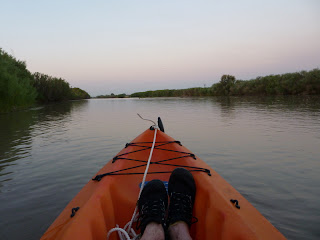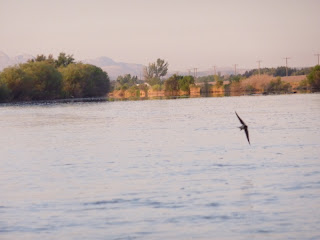After dropping off my bike, I drive my truck to the kayak put-in area under a bridge. When I arrive, I’m greeted by three Hispanic boys who appear to be up to no good. They are hanging out by their truck, music blaring. The ring leader approaches and asks in his alcohol laden breath, “are you gonna fishing?” “No, I’m going down the river in my kayak,” I reply. The other two stand by nervously, while their spokesperson incriminates them all. After some more nonsensical small talk, the boss gives me the cool person’s hand shake complete with front and back hand slides and ending with a fist bump. “Adios amigo”. “Ciao”, I say.
I prepare the kayak and am ready to launch. The boys crank up their conjunto music for my departure. Well, I guess that is better than hearing banjos at the beginning of your river journey.
WARNING: This clip is rated R for language at the very end.
I slide into my sit-on-top Ocean Kayak and push off into the current. The sun is barely starting to rise and the air is fresh. I look behind me and see the mountains shrouded in a red haze from the distant Wallow fire (Arizona). There is something special about stealthily slipping along the river bank where many have paddled before. If not for this river, settlements, missions, towns, and cities would not have sprung up in this harsh country. It is our life blood.
The river is usually all but dry until the farming season, when the Bureau of Reclamation releases water from the Elephant Butte and Caballo reservoirs upstream. Water has always been a hot button issue in the arid west. The result has been the construction of thousands of dams for irrigation, flood control, and hydroelectric power.
The Rio Grande and its tributaries have 16 dams and the US alone has around 85,000. Many have created hazards to fish, displaced humans, and flooded scenic valleys and canyons. Did you know that the Yosemite Valley was once considered to become a large reservoir by damming the Merced River? According to John Muir, the Hetch Hetchy Valley, that is now a reservoir, was on par with Yosemite.
"Dam Hetch Hetchy! As well dam for water-tanks the people's cathedrals and churches, for no holier temple has ever been consecrated by the heart of man." -- John Muir
As I paddle along in my little boat, I think about the many eons the Rio Grande flowed unimpeded before man tamed it and settled on its banks. One day (long after I’m gone) this river is sure to flow wild and free once again.
I come to a section of “fast” water running around a small island. Ducks are enjoying the morning as much as I am. Red winged blackbirds are abundant and swallows are performing acrobatic flying maneuvers as they get their morning meal. Birds and other wildlife rely on this precious resource that cuts through the Chihuahuan Desert. In the past, I have seen coyotes prowling the banks and the work of beavers on the trees.
I come to a little cove so I decide to stop. I get out to explore, stretch my legs, and have a drink. It almost looks like a little pond surrounded by trees and bushes. Feeling refreshed, I get back in my vessel and am soon approaching a snowy egret. I try to get a decent picture to no avail. He keeps flying off when I get close enough for a shot. Try keeping a kayak pointed downstream while operating a camera without losing it in the drink.
I continue on my way and then happen upon another wading bird. The black-necked stilt is characterized by his long skinny legs (with knees in the back), black head and white eye. I enjoy watching his every comical move as he stalks his prey along the edge of a sandbar. I could sit here all day, but need to keep going.
I swing my paddle left, right, left, right cutting into the water with each stroke. I get a nice rhythm going. I like the feel of the resistance and pick up the pace for a while. I come to a large island in the middle of the river and have to decide left or right. I go left and spook some more birds. A great blue heron takes flight before I can get close. I also see two cormorants (double-crested or neotropic) sitting on some brush, wings outstretched. Cormorants are excellent divers and swim low in the water so you can only see their neck and head much like the periscope on a submarine.
It has been a great morning for paddling and bird watching, but I’m almost at my take-out point. Getting in and out is always the critical part of any kayak trip and so I do my best to land on the steep slippery embankment. I pull in and grab onto a beached stump to keep my boat from drifting past the landing. I carefully step into the mud and climb up onto land. Whew, made it.
After having a snack and drink, I make the transition from yak to bike. I unlock my bike and put the long chain around my boat and lock it. Two hours have passed and the sun is getting higher in the sky. I start pedaling and cross a bridge to get on the river trail that leads me back to my starting point.
On the way, I see some Mexican evening primrose along the banks of the river. I stop to get some pictures and notice a green grasshopper in one of the gorgeous pink blossoms. I hop back on and keep pedaling. I cross a little foot bridge that takes me over a marsh complete with cattails.
I approach a clear meadow and see some interesting birds flitting up and down hunting bugs. The western meadowlark has a yellow belly with a black V near the neck much like a bib. A beautiful little songbird, but unfortunately, I’m not able to get a clear picture. On I go up river; starting to sweat now.
Are those geese ahead? Yes, three Canada geese are waddling around by the edge of the river. They don’t seem frightened at all, and one is eying me over pretty good. You don't play the banjo, do you? After only 30 minutes of bike riding I’m back to the truck having made a complete circle using two modes of travel.
I rest under the bridge and watch the grand finale of my morning. Cliff swallows feeding their babies are the stars of this show. The craftsmanship that goes into their adobe nests is to be admired and they never stop for more than a few seconds before they carry on hunting for their young.
In three hours on the river I saw at least ten species of birds, three drunken boys, and heard no banjo music. A successful river trip if I ever saw one. Now for some coffee.
See you on the trail.

















